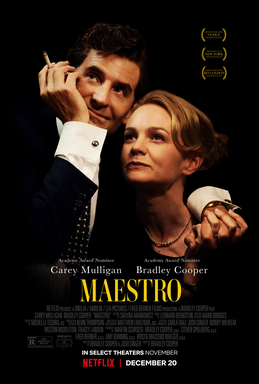
Maestro, released December 20, 2023, is a biographical drama about the personal life of famous conductor and composer Leonard Bernstein. In the eyes of many reviewers, it has been criticized as episodic, tedious, and incoherent. But a closer look reveals a cinematographic masterpiece with spectacular acting and a beautiful impact.
The movie’s focus strayed from what most expected from a film about Leonard Bernstein. Rather than focusing on his musical career and legacy, it showed a slice of Bernstein’s romantic life and portrayed him as a human—one with a complex identity and multitude of flaws. Bradley Cooper, the director of Maestro and writer alongside Josh Singer, starred as Bernstein, and gave a phenomenal performance. His acting was near flawless, perfectly capturing the conductor. His childlike wonder and bubbly charisma permeated the film, and breathed life into what was fundamentally a broken, storyless movie.
There was no cohesive plot or momentum. Instead, Maestro jumped between countless unrelated scenes, telling the audience *who* Leonard Bernstein was, without bombarding them with nothing but the music and career he is best known for. While possibly confusing for viewers without background knowledge, and perhaps not ideal for a movie, it allowed Maestro to be truly, honestly biographical. Additionally, while there was little attention given to what is indisputably the most important part of Bernstein’s legacy, it fully embraced Bernstein’s conducting career, and assumed the audience knew of it in advance. It was present throughout the whole film, but only showed itself through the few conducting scenes, which were each done incredibly well. For instance, the cathedral scene, in which Bradley Cooper reenacts Bernstein’s conducting of Gustav Mahler’s Second Symphony. Here is a video of the original performance, and here is Maestro’s recreation.
Maestro, for its depiction of Bernstein in a delicate, comprehensive medium, is stunning. It is genuinely excellent in its range of emotions, and offers a nuanced interpretation of an immeasurably influential person. However, it is not flawless.
The aforementioned episodic storytelling works well with the biographical nature of Maestro, but could become difficult to follow and engage it, especially given the runtime of over 2 hours. It is slow and doesn’t seem to move anywhere, with effectively nothing but conversation throughout the whole movie. It isn’t a particularly satisfying or happy film, with its brutally honest illustration of the utter downward spiral that Bernstein’s personal life was. While it is, at its roots, a movie about love, it isn’t one where it prospers or ends nicely. For some, the movie could even be dragging, with a dull and boring plot that reeks of depressing overtones due to its heavy demonstration of Bernstein’s problems and shortcomings.
It is a movie that slaps you in the face with the truth of his life, and makes you watch for over half of the movie as Bernstein destroys his family. The acting is so well done that it excels at making you feel uncomfortable. It completely succeeds in its telling of the conductor’s personal life, and for this reason, is an absolute master class in of film making. While the Maestro may not be the ideal film for everyone, it undoubtably fulfills its purpose, and does so beautifully.



















































